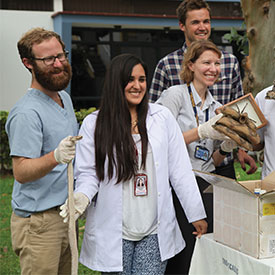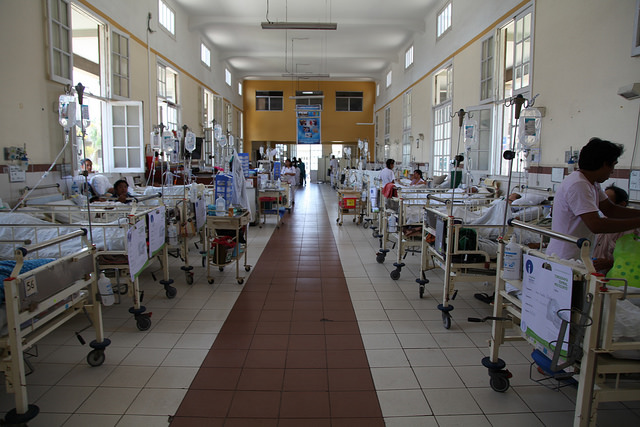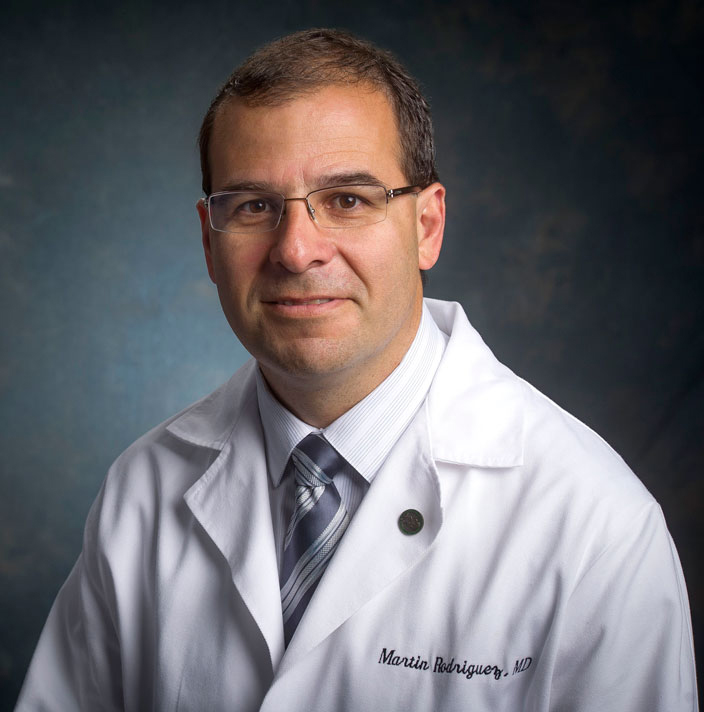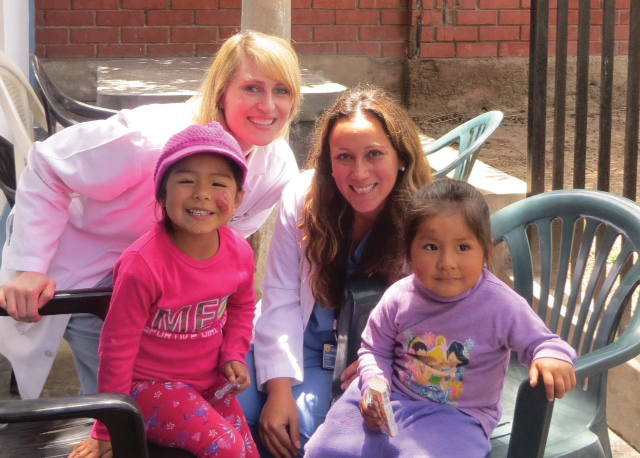 Joshua Stripling (far left) participates in a hands-on envenomation lecture at the Gorgas Course in Lima, Peru.
Joshua Stripling (far left) participates in a hands-on envenomation lecture at the Gorgas Course in Lima, Peru.
A gift to the Tinsley Harrison Internal Medicine Residency Program is helping to support resident training through the expansion of the program’s Global Health Track. The Global Health Track offers final-year residents the opportunity to take part in a month-long international rotation that combines clinical experience, didactics, and hands-on training. “Over the last 10 years, medical schools have experienced a dramatic increase in the number of residents who want to study medicine abroad,” says Martin Rodriguez, M.D., FACP, FIDSA, associate professor in the Department of Medicine and the Global Health Track faculty advisor. “From rural hospitals in Zambia to teaching clinics in Cameroon, we want our residents to experience education in a way they cannot in Birmingham.”
The Global Health Track nurtures service-learning in developing communities while enhancing UAB’s reputation as one the nation’s leading internal medicine training programs. Funds that support the Global Health Track help offset the cost of travel, lodging, vaccinations, and registration fees. “Leaving home to study abroad is a commitment,” says Rodriguez. “So, providing this learning opportunity to residents at no cost is crucial not only for current residents, but it also helps us attract medical students who are considering applying to the Tinsley Harrison Internal Medicine Residency Program.”
 A ward at Cayetano Heredia National Hospital in Lima, Peru.
A ward at Cayetano Heredia National Hospital in Lima, Peru.
Growing Our Global Residency Training
To support Department of Dermatology residency training, contact Austin Hardison at 205-934-7829 or austinh@uab.edu. The Department of Surgery is currently developing a program to send fourth-year general surgery residents to Australia for one- to two-month rotations at hospitals in Sydney and Melbourne. According to Department Chair Herbert Chen, M.D., “As business is becoming more global, so is medicine. We can learn about the best ways to distribute health care from other health systems around the world. The U.S. spends the most on health care per capita, but does not necessarily provide the most cost-effective care. By sending residents to other countries with different, modern health care systems, we hope that they will learn strategies and practices that can be implemented here in the U.S. Similarly, our residents may bring new ideas to their overseas locations as well.” To support Department of Surgery residency training, contact Leon H. Ryan III at 205-996-0127 or leonryan@uab.edu. |
One of the most important aspects of the Global Health Track is the extraordinary opportunity to study health care disparities in disadvantaged populations, says Lisa L. Willett, M.D., the Dr. Tinsley R. Harrison Endowed Chair in Medical Resident Education and director of the Tinsley Harrison Internal Medicine Residency Program. “Unfortunately, health disparities exist not only around the globe but also right here in our community. The Global Health Track trains residents to understand illnesses, treatments, and disparities of diverse patient populations. Through this global medicine experience, our residents have an exclusive opportunity to support a community abroad, and to better serve our local community in the future.”
 Martin Rodriguez, faculty advisor to the Department of Medicine Tinsley Harrison Internal Medicine Residency’s Global Health Track. The philanthropic gift allowed nine internal medicine residents to participate in the Global Health Track in 2015, compared to three residents who participated in 2014. Additionally, one resident was selected to attend the Gorgas Course in Tropical Medicine, a nine-week course in Lima, Peru, and the leading tropical medicine course in the world (learn more about the Gorgas Course on page 13). “UAB has a global reputation in tropical medicine,” says Joshua Stripling, M.D., the 2015 Tinsley Harrison Internal Medicine Residency Program Gorgas Course recipient. “We might reside in Alabama, but we live in a global world. Providing residents the opportunity to obtain a global education is vital to preparing future physicians.”
Martin Rodriguez, faculty advisor to the Department of Medicine Tinsley Harrison Internal Medicine Residency’s Global Health Track. The philanthropic gift allowed nine internal medicine residents to participate in the Global Health Track in 2015, compared to three residents who participated in 2014. Additionally, one resident was selected to attend the Gorgas Course in Tropical Medicine, a nine-week course in Lima, Peru, and the leading tropical medicine course in the world (learn more about the Gorgas Course on page 13). “UAB has a global reputation in tropical medicine,” says Joshua Stripling, M.D., the 2015 Tinsley Harrison Internal Medicine Residency Program Gorgas Course recipient. “We might reside in Alabama, but we live in a global world. Providing residents the opportunity to obtain a global education is vital to preparing future physicians.”
For information on supporting the Tinsley Harrison Internal Medicine Residency Program, contact Mallie Hale at 205-975-5661 or mshale@uab.edu.
By Jessica Martindale
 Numerous residency programs across the school offer international training opportunities and rely on philanthropic support to make these valuable programs available. In September 2014, Department of Dermatology residents Jennifer Nelson, M.D., and Lucia Seminario-Vial, M.D., Ph.D., traveled to Lima, Peru, to take part in an exchange program with the Universidad Cayetano Heridia. Over the course of five days, the pair saw approximately 150 patients in a government-run hospital, many of whom suffered from tropical skin diseases and advanced cases of more common diseases. They attended a clinic specializing in the parasitic disease leishmaniasis, and saw a variety of tropical skin conditions.
Numerous residency programs across the school offer international training opportunities and rely on philanthropic support to make these valuable programs available. In September 2014, Department of Dermatology residents Jennifer Nelson, M.D., and Lucia Seminario-Vial, M.D., Ph.D., traveled to Lima, Peru, to take part in an exchange program with the Universidad Cayetano Heridia. Over the course of five days, the pair saw approximately 150 patients in a government-run hospital, many of whom suffered from tropical skin diseases and advanced cases of more common diseases. They attended a clinic specializing in the parasitic disease leishmaniasis, and saw a variety of tropical skin conditions.